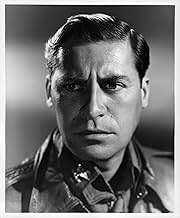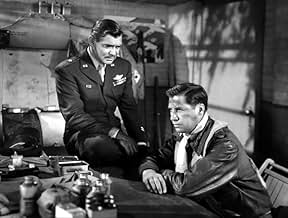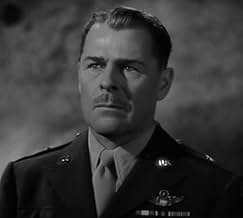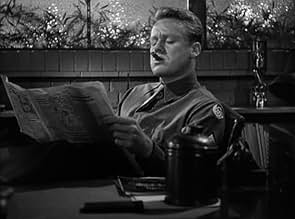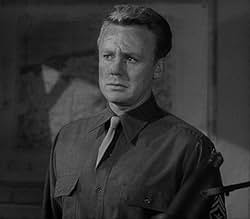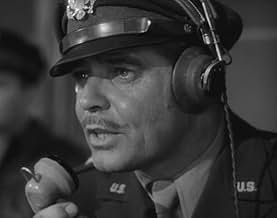AVALIAÇÃO DA IMDb
7,3/10
2,2 mil
SUA AVALIAÇÃO
Adicionar um enredo no seu idiomaArmy generals struggle with the decision to prioritize bombing the German factories producing new jet fighters over the extremely high casualties the mission will cost.Army generals struggle with the decision to prioritize bombing the German factories producing new jet fighters over the extremely high casualties the mission will cost.Army generals struggle with the decision to prioritize bombing the German factories producing new jet fighters over the extremely high casualties the mission will cost.
- Direção
- Roteiristas
- Artistas
- Prêmios
- 3 vitórias e 2 indicações no total
- Direção
- Roteiristas
- Elenco e equipe completos
- Produção, bilheteria e muito mais no IMDbPro
Avaliações em destaque
I found an old tape of Command Decision which I must have made 20 years ago. I concur with all those who have said that it is one of the best WW2 films ever made, but what struck me most forcefully was the fact that this highly intelligent, gripping and thoughtful film was made with a large crew of established filmstars by a completely commercial film studio. It brought home to me forcibly what was lost when the old studio system broke up and the sheer craftsmanship which it embodied was dispersed. The sheer childishness of most current films becomes even more evident.
Writing as one who lived through the bombing of Britain, the historical perspective on the Allied wartime bombing campaign was fascinating. One small complaint--all film coverage of the American campaign in WW2 seems to focus on the Flying Fortress. Actually, most of the bombs were dropped by the Consolidated Liberator squadrons--less photogenic but more effective!
Writing as one who lived through the bombing of Britain, the historical perspective on the Allied wartime bombing campaign was fascinating. One small complaint--all film coverage of the American campaign in WW2 seems to focus on the Flying Fortress. Actually, most of the bombs were dropped by the Consolidated Liberator squadrons--less photogenic but more effective!
(There May Be Spoilers) Launching "Operation Stich" a week ahead of time, due to the favorable weather conditions over Germany, Brig. Gen. K.C Dennis', Clark Gable, B-17 Bombers suffer the loss of 48 aircraft on the first day's mission.
Going some 600 miles into Germany, without fighter escort, in a triangular bombardment of the key German industrial cities of Posenleben Schweinhafen and Fendelhorst. Gen. Dennis is determined to take them out Before the weather worsens and doesn't care how many planes and crews it costs him to do it.
The next days bombing of Schweinhafen cost another 24 B-17's. Due to German ingenuity in camouflaging the factories there the USAAF bombed the wrong city making it necessary to go on a bomb run the next day on the real Schweinhafen. By now the USAAF crews are at the point of refusing to go on their missions over Germany feeling that Gen.Dennis is out of his mind by sending then to certain death.
Gen. Dennis' superior and friend Maj. Gen. Kane, Walter Pigeon, is very upset with his actions and is about to relive him of his duties as combat-wing commander. Since Gen. Dennis launched his assault on Germany he lost some 70 bombers in two days compared to the loss of under 20 bombers lost by the RAF during the same period.
In a private meeting with Gen. Kane and other USAAF top personnel Gen. Dennis makes his case for the actions that he's taken even if it coast him his command of the B-17 combat-wing. The Germans are developing this revolutionary jet-fighter, the Lantze-Wolf. The Nazi Super-Plane is so superior to anything that the allies have that if it's manufactured in mass and put in the air the German Luftwaffe would drive the USAAF and RAF from the skies of Europe. It would make it impossible for a cross channel invasion of Europe the next year, 1944, and cost the allies the war.
Unable to open a second front in Western Europe and with the Luftwaffe having total air supremacy will force the allies, the USA UK and USSR, to agree to an armistice and peace treaty with the Germans on Hitler's terms. The bombing of those cities deep in Germany by Gen. Dennis' bombers will destroy the Germans ability to mass-produce the Lantez-Wolf. Thus save in the future countless American and Allied soldiers lives at the cost of the heavy, but necessary, losses in B-17 and their crews now.
This causes Gen. Kane to look the other way, knowing how right Gen. Dennis is, by allowing him to send his bombers out the next day and finally knock out the German industrial city of Schweinhafen. The bombing raid cost the life of Gen. Dennis best friend Col. Martin,John Hodiak. It's also in Schweinhafen where the jet-fighter is being assembled and in the end because of the heavy losses in that bombing raid Gen. Kane is forced, reluctantly, to relive Gen. Dennis of his command. US politicians like Congressman Arthur Malcolm, Edward Arnold, afraid of how the people back home feel about the staggering losses in the skies over Germany and Gen. Dennis' actions being responsible for them it's only a matter of time for him to be dismissed as a USAAF combat-wing commander.
The general took his dismissal with the same courage as his men took the murderous anti-aircraft fire and attacks of German fighters on the missions that he sent them on. Being replaced by his friend and fellow classmate at West Point Let. Gen. Clifton Garnet,Brian Donlevy.
Gen. Garnet also goes against the top brass, the next day, in ordering the bombing of Fendelhorst in central Germany to take out the last place where the deadly Lantze-Wolf are being made. With that, facing the same fate that Gen. Dennis just went through, ended up winning the war for the allies at the possible cost of his military career.
The truth is that like in the movie "Command Dicision" the Germans did develop a jet-fighter late in the war that if it was mass-produced and sent up against the allied air forces a year earlier would have won the Second World War for Germany. The German Masserschmitt Me-262 jet fighter could reach speeds of 540 to 580 MPH that was some 100 to 150 MPH faster then the swiftest USAAF and RAF fighters. In combat it scored as much as 700 combat kills over allied planes during 1944-1945. In their last major air to air engagement over Berlin in March 1945 some dozen Me-262's downed 25 B-17 and 5 fighter escorts to the loss of only two of their own.
Under 300 of the Me-262 jets put into combat and with, for the most part, them being flown by unexperienced pilots and with a shortage of jet fuel to keep the planes airborne for any long period of time. It turned out that the decision of USAAF generals like K.C Dennis to bomb the factories where the Me-262 were being made, despite the heavy allied air losses, that in the end won the war for the Allies in Europe.
Going some 600 miles into Germany, without fighter escort, in a triangular bombardment of the key German industrial cities of Posenleben Schweinhafen and Fendelhorst. Gen. Dennis is determined to take them out Before the weather worsens and doesn't care how many planes and crews it costs him to do it.
The next days bombing of Schweinhafen cost another 24 B-17's. Due to German ingenuity in camouflaging the factories there the USAAF bombed the wrong city making it necessary to go on a bomb run the next day on the real Schweinhafen. By now the USAAF crews are at the point of refusing to go on their missions over Germany feeling that Gen.Dennis is out of his mind by sending then to certain death.
Gen. Dennis' superior and friend Maj. Gen. Kane, Walter Pigeon, is very upset with his actions and is about to relive him of his duties as combat-wing commander. Since Gen. Dennis launched his assault on Germany he lost some 70 bombers in two days compared to the loss of under 20 bombers lost by the RAF during the same period.
In a private meeting with Gen. Kane and other USAAF top personnel Gen. Dennis makes his case for the actions that he's taken even if it coast him his command of the B-17 combat-wing. The Germans are developing this revolutionary jet-fighter, the Lantze-Wolf. The Nazi Super-Plane is so superior to anything that the allies have that if it's manufactured in mass and put in the air the German Luftwaffe would drive the USAAF and RAF from the skies of Europe. It would make it impossible for a cross channel invasion of Europe the next year, 1944, and cost the allies the war.
Unable to open a second front in Western Europe and with the Luftwaffe having total air supremacy will force the allies, the USA UK and USSR, to agree to an armistice and peace treaty with the Germans on Hitler's terms. The bombing of those cities deep in Germany by Gen. Dennis' bombers will destroy the Germans ability to mass-produce the Lantez-Wolf. Thus save in the future countless American and Allied soldiers lives at the cost of the heavy, but necessary, losses in B-17 and their crews now.
This causes Gen. Kane to look the other way, knowing how right Gen. Dennis is, by allowing him to send his bombers out the next day and finally knock out the German industrial city of Schweinhafen. The bombing raid cost the life of Gen. Dennis best friend Col. Martin,John Hodiak. It's also in Schweinhafen where the jet-fighter is being assembled and in the end because of the heavy losses in that bombing raid Gen. Kane is forced, reluctantly, to relive Gen. Dennis of his command. US politicians like Congressman Arthur Malcolm, Edward Arnold, afraid of how the people back home feel about the staggering losses in the skies over Germany and Gen. Dennis' actions being responsible for them it's only a matter of time for him to be dismissed as a USAAF combat-wing commander.
The general took his dismissal with the same courage as his men took the murderous anti-aircraft fire and attacks of German fighters on the missions that he sent them on. Being replaced by his friend and fellow classmate at West Point Let. Gen. Clifton Garnet,Brian Donlevy.
Gen. Garnet also goes against the top brass, the next day, in ordering the bombing of Fendelhorst in central Germany to take out the last place where the deadly Lantze-Wolf are being made. With that, facing the same fate that Gen. Dennis just went through, ended up winning the war for the allies at the possible cost of his military career.
The truth is that like in the movie "Command Dicision" the Germans did develop a jet-fighter late in the war that if it was mass-produced and sent up against the allied air forces a year earlier would have won the Second World War for Germany. The German Masserschmitt Me-262 jet fighter could reach speeds of 540 to 580 MPH that was some 100 to 150 MPH faster then the swiftest USAAF and RAF fighters. In combat it scored as much as 700 combat kills over allied planes during 1944-1945. In their last major air to air engagement over Berlin in March 1945 some dozen Me-262's downed 25 B-17 and 5 fighter escorts to the loss of only two of their own.
Under 300 of the Me-262 jets put into combat and with, for the most part, them being flown by unexperienced pilots and with a shortage of jet fuel to keep the planes airborne for any long period of time. It turned out that the decision of USAAF generals like K.C Dennis to bomb the factories where the Me-262 were being made, despite the heavy allied air losses, that in the end won the war for the Allies in Europe.
Just saw this on TCM. The story of generals fighting generals, press officers, politicians, etc. There's a few cliches, like the pilot who get news his wife has had a son gets killed during a mission. Don't expect Gable to give an over-the-top performance. It was originally a stage play -- so there are lots of one-on-one confrontations -- they are all done well.
There are no special effects, no women, no air battles. There's spliced in newsreel footage of a plane that lands and explodes. 1948 audiences couldn't really appreciate the abstraction of "air supremacy" that is the heart of the fight here. In our post-Gulf War post-Afghan War -- we now can appreciate the vision of men who took these risks -- so I'd say there's a special historical importance to this film. Check around the web for info on Gable's WW II service record -- he enlisted at age 41 into the Army Air Corps.
There are no special effects, no women, no air battles. There's spliced in newsreel footage of a plane that lands and explodes. 1948 audiences couldn't really appreciate the abstraction of "air supremacy" that is the heart of the fight here. In our post-Gulf War post-Afghan War -- we now can appreciate the vision of men who took these risks -- so I'd say there's a special historical importance to this film. Check around the web for info on Gable's WW II service record -- he enlisted at age 41 into the Army Air Corps.
"Command Decision" is a wonderful film filled with several great performances. It's Gable's movie, but he's very capably supported by Walter Pigeon, Brian Donlevy and John Hodiak, who nearly equals his "Lifeboat" performance.
Pigeon is especially good in the roll of a senior commander who is more concerned with the political considerations of the war effort than the tactical and strategic goals. (Not without reason - The film correctly details the perilous and tenuous position that the 8th Air Force found itself in during the worst combat period of 1943.)
One of the best scenes in the film is a very long speech given by Pigeon, wherein he explains his reasons for fighting the good fight to keep American air power strong. The scene is a good 6 or 7 minutes long, one camera shot, entirely done without cuts. It must have been rehearsed extensively as it requires about 10 actors to interact with Pigeon at several times, all the while he is moving about the room. Seamless, and very well done! This remarkable scene is followed up with one almost as long, given by Gable.
The drama is occasionally broken up with comic moments provided by Van Johnson, as a savvy sergeant, and Clinton Sunberg as a fastidious aide to Pigeon's General Kane.
If you like to watch actors banging away with words instead of guns, this is the war movie for you.
Pigeon is especially good in the roll of a senior commander who is more concerned with the political considerations of the war effort than the tactical and strategic goals. (Not without reason - The film correctly details the perilous and tenuous position that the 8th Air Force found itself in during the worst combat period of 1943.)
One of the best scenes in the film is a very long speech given by Pigeon, wherein he explains his reasons for fighting the good fight to keep American air power strong. The scene is a good 6 or 7 minutes long, one camera shot, entirely done without cuts. It must have been rehearsed extensively as it requires about 10 actors to interact with Pigeon at several times, all the while he is moving about the room. Seamless, and very well done! This remarkable scene is followed up with one almost as long, given by Gable.
The drama is occasionally broken up with comic moments provided by Van Johnson, as a savvy sergeant, and Clinton Sunberg as a fastidious aide to Pigeon's General Kane.
If you like to watch actors banging away with words instead of guns, this is the war movie for you.
Command Decision was adapted from a Broadway play that ran for 409 performances the previous year. Tony Awards were won by Paul Kelly who played General K.C. Dennis and James Whitmore for Tech Sergeant Emanuel Evans. The play shows the process of making military decisions when you have to factor in the politicians who control the purse strings. It's a necessary evil in a society that values civilian control of the military.
Both during and after World War II there was a debate among the British and American air commanders over the value of daylight versus nighttime bombing attacks. The British did night raids over Germany, responding in kind to what the Luftwaffe had done to them. Fly over at high altitudes and just drop the bombs. It did make for fewer casualties among the RAF pilots of their Lancaster bombers.
The Americans opted for daylight raids at a lower altitude trying to hit certain strategic objectives. In Command Decision it involves three factories that intelligence has learned are manufacturing new jet aircraft. If the Nazis had ever developed the far advanced jets against the Allied propeller aircraft in any number, the course of the war over Europe might have changed. Just like the V-2 rockets were developed too late to help the Axis cause.
Command Decision has Clark Gable leading a distinguished cast as the general who has to make the decision about whether to bomb or not, to go into Germany's heartland without fighter escort. Unfortunately his purely military outlook is not shared by his immediate superior Walter Pidgeon who has to factor in the politicians in Congress who read the dispatches by correspondents like Charles Bickford here about the appalling losses in American life.
In many ways Pidgeon has the most difficult part in the film. He has to take in the voices of objection raised by the visiting Congressional delegation led by Edward Arnold. Pidgeon is a politician, but purely by necessity. We admire Gable's stand on principle, but the audience also respects Pidgeon and sympathizes with him.
On Broadway Command Decision takes place in the headquarters and to make it better for the screen, playwright William Wister Haines wrote an additional scene that Paul Kelly did not do on Broadway. Clark Gable on a radio microphone tries to talk down a bombardier who is piloting a plane where the pilot and co-pilot are wounded and killed. It's a harrowing scene and one of the best Clark Gable ever did. Gable must have drawn from his World War II experience, he was a tailgunner in our Army Air Corps and flew many a B-17 mission over Germany.
Rounding out a distinguished group of MGM contractees are Van Johnson, Brian Donlevy, Marshall Thompson, Cameron Mitchell, Warner Anderson, Ray Collins, John McIntire and John Hodiak. They all cast well as Army Air Force personnel. Johnson plays the part that James Whitmore originated on stage and provides what little humor there is in this film.
The main criticism of Command Decision has always been that it is too stagey. But I found it an absorbing account of the decision making process in a military command.
Both during and after World War II there was a debate among the British and American air commanders over the value of daylight versus nighttime bombing attacks. The British did night raids over Germany, responding in kind to what the Luftwaffe had done to them. Fly over at high altitudes and just drop the bombs. It did make for fewer casualties among the RAF pilots of their Lancaster bombers.
The Americans opted for daylight raids at a lower altitude trying to hit certain strategic objectives. In Command Decision it involves three factories that intelligence has learned are manufacturing new jet aircraft. If the Nazis had ever developed the far advanced jets against the Allied propeller aircraft in any number, the course of the war over Europe might have changed. Just like the V-2 rockets were developed too late to help the Axis cause.
Command Decision has Clark Gable leading a distinguished cast as the general who has to make the decision about whether to bomb or not, to go into Germany's heartland without fighter escort. Unfortunately his purely military outlook is not shared by his immediate superior Walter Pidgeon who has to factor in the politicians in Congress who read the dispatches by correspondents like Charles Bickford here about the appalling losses in American life.
In many ways Pidgeon has the most difficult part in the film. He has to take in the voices of objection raised by the visiting Congressional delegation led by Edward Arnold. Pidgeon is a politician, but purely by necessity. We admire Gable's stand on principle, but the audience also respects Pidgeon and sympathizes with him.
On Broadway Command Decision takes place in the headquarters and to make it better for the screen, playwright William Wister Haines wrote an additional scene that Paul Kelly did not do on Broadway. Clark Gable on a radio microphone tries to talk down a bombardier who is piloting a plane where the pilot and co-pilot are wounded and killed. It's a harrowing scene and one of the best Clark Gable ever did. Gable must have drawn from his World War II experience, he was a tailgunner in our Army Air Corps and flew many a B-17 mission over Germany.
Rounding out a distinguished group of MGM contractees are Van Johnson, Brian Donlevy, Marshall Thompson, Cameron Mitchell, Warner Anderson, Ray Collins, John McIntire and John Hodiak. They all cast well as Army Air Force personnel. Johnson plays the part that James Whitmore originated on stage and provides what little humor there is in this film.
The main criticism of Command Decision has always been that it is too stagey. But I found it an absorbing account of the decision making process in a military command.
Você sabia?
- CuriosidadesClark Gable enlisted in the US Army Air Forces after his wife Carole Lombard died in a plane crash on a war bonds selling trip assisting the war effort. Gable went to Officers Candidate School (OCS), graduating as a second lieutenant, and was eventually promoted to major. He was trained as an aerial gunner and combat cameraman and was awarded both the Distinguished Flying Cross and Air Medal for at least five aerial bombing missions over Germany from England with the 351st Bomb Group (Heavy). Adolf Hitler personally offered a reward to the pilot or anti-aircraft gun crew who shot down Gable's plane.
- Erros de gravaçãoWhen General Dennis tries to talk down the bombardier flying the crippled bomber, the bombardier reports that the aircraft's fuel is exhausted. Presumably he had also dropped his bomb load over the target. His on-board supply of machine gun ammunition should be very low if not exhausted. Yet when the bomber crashes, it explodes and burns. If he has no bombs, no gas , and no machine gun ammunition, what's to burn?
- Citações
James Carwood: What's the answer, Brockie, all guts and no brain?
Elmer Brockhurst: No. That's putting it too simply. Dennis is one of those boys whose brain is fascinated by guts. He loves this lousy war.
- Versões alternativasAlso available in a computer colorized version.
- ConexõesFeatured in Clark Gable: Tall, Dark and Handsome (1996)
Principais escolhas
Faça login para avaliar e ver a lista de recomendações personalizadas
- How long is Command Decision?Fornecido pela Alexa
Detalhes
Bilheteria
- Orçamento
- US$ 2.467.000 (estimativa)
- Tempo de duração1 hora 52 minutos
- Cor
- Proporção
- 1.37 : 1
Contribua para esta página
Sugerir uma alteração ou adicionar conteúdo ausente


